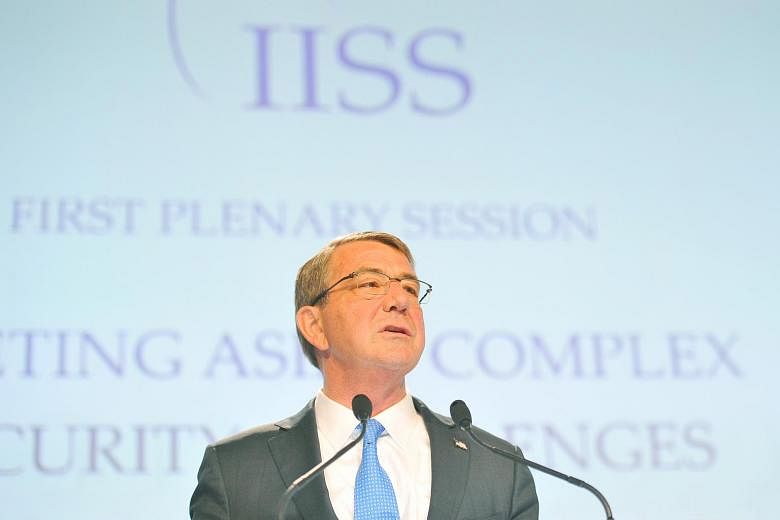US Defence Secretary Ashton Carter has warned Beijing against provocative behaviour in its foreign affairs, saying it not only raises tension but is also "self-isolating".
This notion, however, was rejected by the Chinese, who said it is a "fabrication" intended to isolate China.
Dr Carter told delegates at this year's Shangri-La dialogue that China's unilateral actions in the South China Sea meant that it could "end up erecting a Great Wall of self-isolation".
He added: "The United States will remain the most powerful military and main underwriter of security in the region for decades to come - and there should be no doubt about that."
The US Pacific Commander, Admiral Harry Harris, told reporters separately that the US "wants to cooperate with China in all domains as much as possible... but we have to confront them if we must".
Dr Carter's speech drew a sharp rebuttal soon afterwards from Rear-Admiral Guan Youfei, director of the Foreign Affairs Office of China's National Defence Ministry, who called the idea of a self-isolated China "totally groundless".
"We think this is a self-fabricated concept... The purpose of this concept is to isolate China," he said.
The persistent irritant of the South China Sea in the two major powers' relationship played out yesterday at the 15th Shangri-La Dialogue security summit, organised by the London-based International Institute of Strategic Studies (IISS).
"Unfortunately, there is growing anxiety in this region about China's activities on the seas, in cyberspace, and in the region's airspace," Dr Carter told more than 560 delegates in his address. China lays claim to almost all of the South China Sea, and has said it will reject an upcoming ruling by the Permanent Court of Arbitration in a case brought by the Philippines.
"(The ruling is) an opportunity for China and the rest of the region to recommit to a principled future, to renewed diplomacy, and to lowering tensions," said Dr Carter, who used "principled" at least 38 times to stress the need for a "principled security network" based on international rules and norms.
Peking University international relations analyst Jia Qingguo told The Sunday Times that China should not be "forcefully pushed" to accept the ruling. "It will damage the relationship between China and other countries and cause the problem to be even more difficult to resolve," he said, noting that the best way is to delay the ruling and let China and the Philippines discuss the issue.
Philippine political analyst Richard Javad Heydarian of De La Salle University noted that President- elect Rodrigo Duterte is "more interested in engaging rather than confronting China" and may treat the ruling "as an advisory opinion in exchange for Chinese concessions in the South China Sea".
There have been calls at the summit, from countries such as Indonesia, Vietnam and Thailand, for Asean unity on the waterway.
Japan, which is involved in a separate dispute with China in the East China Sea, offered to help South- east Asian countries improve their surveillance capabilities. It will also conduct joint training exercises and cooperate in developing new equipment to "maintain order in the South China Sea", said its Defence Minister Gen Nakatani.
Separately, the US, South Korea and Japan agreed to step up trilateral cooperation in the face of the North Korean nuclear threat.
South Korea and Japan will also expand an emergency communication system between their defence ministries, including adding a direct line between their ministers.
On terrorism, South-east Asian defence ministers urged greater cooperation and action to dismantle the Islamic State in Syria and Iraq terror group and the persistent threat it poses to global security.
Singapore Defence Minister Ng Eng Hen told reporters Islam is "a religion that has been hijacked and that it depends on the moderates - not only moderate Muslims but moderates of all religions, or regardless of (their) religions - to take a stand so that the extremists don't get ahead".
TOP OF THE NEWS
China urged to participate in Asia security network
US 'neglects international norms that it champions'
Asean should get its house in order first, says Hishammuddin


